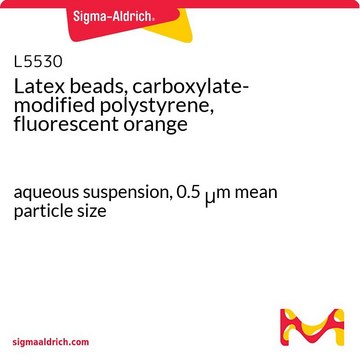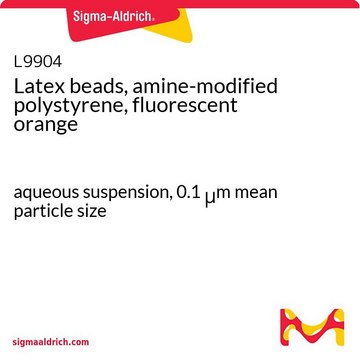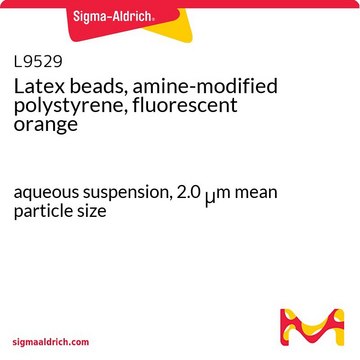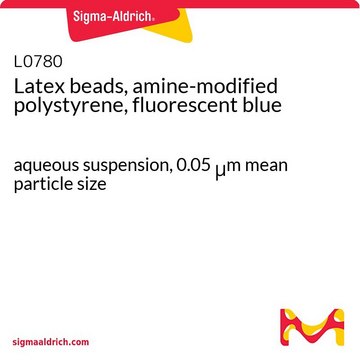L3030
Latex beads, carboxylate-modified polystyrene, fluorescent red
aqueous suspension, 2.0 μm mean particle size
Synonym(s):
Fluorescent latex beads
Sign Into View Organizational & Contract Pricing
All Photos(1)
About This Item
Recommended Products
form
aqueous suspension
Quality Level
contains
0.1% NaN3
composition
Solids, 2.5%
technique(s)
cell based assay: suitable
mean particle size
2.0 μm
fluorescence
λex ~575 nm; λem ~610 nm
application(s)
cell analysis
Looking for similar products? Visit Product Comparison Guide
Application
Carboxylate-modified polystyrene latex beads have been used to collect morphofunctional data about the immune systems of Carabus lefebvrei, a helicophagous Italian endemic ground beetle often used as an indicator of the habitat quality of the Apennines mountain forests. Carboxylate-modified polystyrene latex beads have also been used to inform comparative studies on immunity defense mechanisms of adults and larvae of the coleopteran Cetonischema aeruginosa and to investigate the phagocytic activity of cultured rat thyroid cells.
Storage Class
10 - Combustible liquids
wgk_germany
WGK 2
flash_point_f
Not applicable
flash_point_c
Not applicable
Certificates of Analysis (COA)
Search for Certificates of Analysis (COA) by entering the products Lot/Batch Number. Lot and Batch Numbers can be found on a product’s label following the words ‘Lot’ or ‘Batch’.
Already Own This Product?
Find documentation for the products that you have recently purchased in the Document Library.
Customers Also Viewed
Alessia Serrano et al.
Cells, 8(10) (2019-10-19)
S100A4, belonging to a large multifunctional S100 protein family, is a Ca2+-binding protein with a significant role in stimulating the motility of cancer and immune cells, as well as in promoting pro-inflammatory properties in different cell types. In the CNS
Ting-Feng Wu et al.
Journal of agricultural and food chemistry, 55(24), 9784-9791 (2007-10-27)
Pycnogenol, polyphenolic compounds extracted from the pine bark, is beneficial for human health. To understand more of its effects, the present study is to explore the protein expression pattern induced by pycnogenol in RAW 264.7 cells. Global analysis using two-dimensional
Je-In Youn et al.
Journal of leukocyte biology, 91(1), 167-181 (2011-09-29)
MDSCs are a group of cells with potent immune-suppressive activity. These cells accumulate in many pathologic conditions and play a major role in the regulation of immune responses. The nature of MDSC remains highly debatable. In cancer, most MDSCs are
Steve J Webster et al.
Journal of immunology (Baltimore, Md. : 1950), 185(5), 2968-2979 (2010-07-27)
Peripheral blood monocytes represent the rapid response component of mononuclear phagocyte host defense, generating vigorous but finite antibacterial responses. We investigated the fate of highly purified primary human monocytes following phagocytosis of different bacteria. Exposure to high bacterial loads resulted
Yuichi Kanehiro et al.
Frontiers in microbiology, 9, 1517-1517 (2018-07-28)
Protein kinase G (PknG) is a eukaryotic-like serine/threonine kinase that is expressed by Mycobacterium tuberculosis and promotes survival of mycobacteria in host macrophages by suppressing phagosome-lysosome fusion. Thus, compounds showing inhibitory activity against PknG are promising anti-mycobacterial agents. We therefore
Our team of scientists has experience in all areas of research including Life Science, Material Science, Chemical Synthesis, Chromatography, Analytical and many others.
Contact Technical Service











